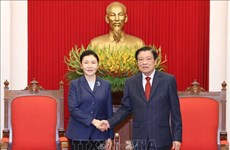VN, Palestine increase trade cooperation
Vietnam ’s Ministry of Industry and Trade and Palestine ’s Ministry
of Economics on September 22 signed a memorandum of understanding on
cooperation in industry and trade.
Vietnam ’s Ministry of Industry and Trade and Palestine ’s Ministry
of Economics on September 22 signed a memorandum of understanding on
cooperation in industry and trade.
Prior to the signing, the leaders of both ministries held talks to boost bilateral trade, which has yet to develop due to the geographical distance, a lack of information and the use of an import-export mechanism that requires business to be done via a third country.
Minister of Industry and Trade Vu Huy Hoang said that the Vietnamese government is willing to work directly with Palestine in the long term.
He committed Vietnam to exporting farm products, particularly tea, coffee, seafood and pepper, to Palestine .
Minister Hoang said that Vietnam sees a lot of potential for exporting garments, footwear, timber and furniture, agricultural and industrial equipment, aquatic and seafood products, farm products and rice to the Middle East market in general and Palestine in particular.
He stated that Vietnam needs to import industrial stone, construction materials, chemicals, pharmaceuticals and farm produce.
To increase two-way trade, both countries need to exchange information on trade policies and trade promotion activities, said Minister Hoang.
He proposed that the two countries conduct negotiations and sign accords and agreements in the areas of economics, finance, and transportation and an agreement on double taxation avoidance.
Vietnam and Palestine should also establish communication channels to provide information for their businesspeople and at the same time create the right conditions to help businesses to invest, conduct market research and open representative offices.
Palestine ’s Economic Minister Hassan Abu Libdeh said he hopes to boost cooperation with Vietnam in every field.
He agreed with Hoang’s proposals and informed him of an upcoming market research tour by a delegation of Palestinian businesspeople.
Representatives from the Ministry of Science and Technology from both countries will sign a memorandum of understanding on quality standards to enable both countries to recognise each others’ products./.
Prior to the signing, the leaders of both ministries held talks to boost bilateral trade, which has yet to develop due to the geographical distance, a lack of information and the use of an import-export mechanism that requires business to be done via a third country.
Minister of Industry and Trade Vu Huy Hoang said that the Vietnamese government is willing to work directly with Palestine in the long term.
He committed Vietnam to exporting farm products, particularly tea, coffee, seafood and pepper, to Palestine .
Minister Hoang said that Vietnam sees a lot of potential for exporting garments, footwear, timber and furniture, agricultural and industrial equipment, aquatic and seafood products, farm products and rice to the Middle East market in general and Palestine in particular.
He stated that Vietnam needs to import industrial stone, construction materials, chemicals, pharmaceuticals and farm produce.
To increase two-way trade, both countries need to exchange information on trade policies and trade promotion activities, said Minister Hoang.
He proposed that the two countries conduct negotiations and sign accords and agreements in the areas of economics, finance, and transportation and an agreement on double taxation avoidance.
Vietnam and Palestine should also establish communication channels to provide information for their businesspeople and at the same time create the right conditions to help businesses to invest, conduct market research and open representative offices.
Palestine ’s Economic Minister Hassan Abu Libdeh said he hopes to boost cooperation with Vietnam in every field.
He agreed with Hoang’s proposals and informed him of an upcoming market research tour by a delegation of Palestinian businesspeople.
Representatives from the Ministry of Science and Technology from both countries will sign a memorandum of understanding on quality standards to enable both countries to recognise each others’ products./.












